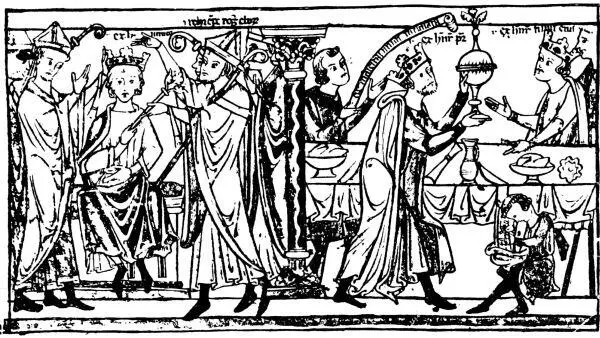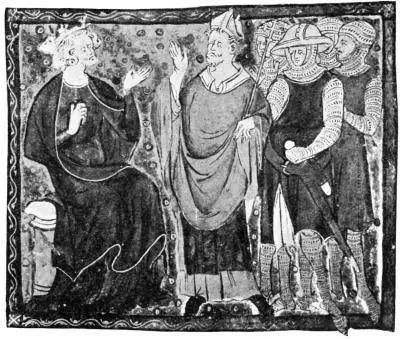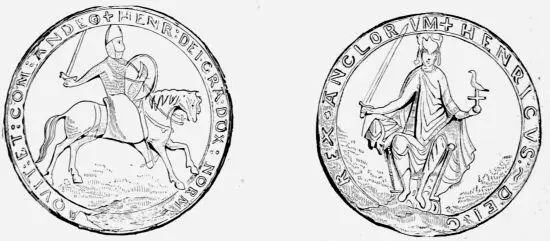
CORONATION OF THE “YOUNG KING”
From Vie de St. Thomas (a French MS., 1230-1260).
If there were unlicensed guilds, there must have been licensed guilds. Unfortunately it is not known how many, or of what kind, these were. Among them, however, was the important and powerful Guild of Weavers, who were at that time to London what the “drapiers” were to Ypres in Flanders. (See p. 201.)
It is sufficient to note the claim of the King to license every guild. As for the fining of the unlicensed guild, since the business of a guild is the regulation of trade, one would like to know how trade was regulated when there was no guild. But enough of this matter for the present.
In this reign occurs an early instance of heresy obstinate unto death. The heretics came over from Germany. There were thirty of them, men and women. They called themselves Publicans; one of them, their leader, Gerard, had some learning: the rest were ignorant. They derided matrimony, the Sacraments of Baptism, the Lord’s Supper, and other articles. Being brought before the King, they were pressed with Scripture, “but stuck manfully to their faith and refused to be convinced.” It was therefore ordered that they should be burned with a hot iron on the forehead, and the leader on the chin as well, that they should be whipped, that they should be thrust out into the fields and that none should give them food, or fire, or lodging; which was done, the sufferers singing all the time, “Blessed are ye when men do hate you”—and so they went out into the open country, where they all died of cold and starvation. A pitiful story!
Here is a strange story told by Stow. It is a good deal amplified from that given by Roger of Hoveden, but perhaps Stow obtained more material from other authorities also:—
“A brother of the Earle Ferrers was in the night privily slayne at London, which when the King understoode, he sware that he would bee avenged on the Citizens: for it was then a common practice in the Citie, and an hundred or more in a company of young and old, would make nightly invasions upon the houses of the wealthie, to the intent to robbe them, and if they found any man stirring in the Citie within the night, they would presently murther him, in so much, that when night was come, no man durst adventure to walke in the Streetes. When this had continued long, it fortuned that a crewe of young and wealthy Cittizens assembling together in the night, assaulted a stone house of a certaine rich manne, and breaking through the wall, the good man of that house having prepared himselfe with other in a corner, when he perceived one of the Theeves named Andrew Bucquinte to leade the way, with a burning brand in the one hand and a pot of coales in the other, whiche he assayed to kindle with the brande, hee flew upon him, and smote off his right hande, and then with a lowde voyce cryed Theeves, at the hearing whereof the Theeves tooke their flight, all saving hee that had lost his hande, whom the good man in the next morning delivered to Richarde de Lucy the King’s Justice. This Theefe uppon warrant of his life, appeached his confederates, of whome many were taken, and many were fled, but among the rest that were apprehended, a certaine Citizen of great countenance, credite, and wealth, surnamed Iohn the olde,1 when he could not acquite himselfe by the Watardome, offered the King for his life five hundred Marks, but the King commanded that he shoulde be hanged, which was done, and the Citie became more quiet.” (Howe’s edition of Stow’s Chronicles, p. 153.)
Here, then, is a case in which the ordeal by water was thought to prove a man’s guilt. In another place will be found described the method of the ordeal by water. What happened was, of course, that the unfortunate man’s arm was scalded. However, the City became quiet, which was some gain.
In the year 1164 London Bridge was “new made of timber” by Peter of Colechurch, who afterwards built it of stone.
In the year 1176 the stone bridge over the river was commenced. It was not completed until 1209, after the death of the architect.
Henry I. had punished the moneyers for their base coin. Henry II. also had to punish them for the same offence, but he chose a method perhaps more effective. He fined them.

BECKET DISPUTING WITH THE KING
From MS. in British Museum—Claudius D2 (Cotton).
The relations of Thomas à Becket with the King: their friendship and their quarrels and the tragic end of the Archbishop, belong to the history of the country. It does concern this book, however, that Thomas was by birth a Londoner. His father, Gilbert, whose family came from Caen, was a citizen of good position, chief magistrate, or portreeve, in the reign of Stephen. Gilbert Becket was remembered in the City not only by the history of his illustrious son, but by the fact that it was he who built the chapel in the Pardon Churchyard, on the north side of St. Paul’s, a place where many persons of honour were buried. It was ever the mediæval custom to make one place more sacred than another, so that if it was a blessed thing to be buried in a certain church, it was more blessed to lie in front of the altar. The old story about Gilbert’s wife being a Syrian is repeated by the historians, and is very possibly true. Holinshed says she was a “Saracen by religion,” which is certainly not true. Thomas Becket was born in wedlock; his father was certainly not married to a Mohammedan, and the birthplace of the future martyr was in a house on the site of the present Mercers’ Chapel, which itself stands on the site of the chapel of St. Thomas of Acon.
Gilbert Becket died leaving behind him a considerable property in houses and lands. Whether the archbishop took possession of this property as his father’s son, or whether he gave it to his sister, I do not know. Certain it is that after his death his sister Agnes, then married to Thomas Fitz Theobald de Heiley, gave the whole of the family estates to endow a Hospital dedicated to her brother Saint and Martyr. Nothing should be kept back: all—all must be given: one sees the intensity of affection, sorrow, pride, with which the new Saint was regarded by his family. There could be no worshipper at the altar of St. Thomas à Becket more devout than his own sister. (See also p. 278.)

GREAT SEAL OF HENRY II.
Table of Contents
The coronation of King Richard on September 3, 1189, was disgraced by a massacre of the Jews—the first example of anti-Jewish feeling. Perhaps when they first came over these unfortunate people hoped that no traditional hatred of the race existed in England. Experience, alas! might have taught them, perhaps had taught them, that hatred grew up round the footsteps of the Infidel as quickly as the thistles in the field. When the Jew arrived in England what could he do? He could not trade because the merchants had their guilds; and every guild had its church, its saint, its priests, its holy days. He could not hold land because every acre had its own lord, and could only be transferred by an Act including a declaration of faith; he could not become a lawyer or a physician because the avenues to these professions lay also through the Church. Did a man wish to build a bridge, he must belong to the Holy Brotherhood of Bridge-Builders—Pontifices. Was an architect wanted, he was looked for in a Monastery. The scholars, the physicians, the artists were men of the cloister. Even the minstrels, gleemen, jugglers, tumblers, dancers, buffoons, and mimes, though the Church did not bless their calling, would have scorned to suffer a Jew among them. That was the position of the Jew. Every calling closed to him, every door shut. There was, however, one way open, but a way of contempt, a way accursed by the Church, a way held impossible to the Christian. He might practise usury. The lending of money for profit was absolutely forbidden by the Church. He who carried on this business was accounted as excommunicated. If he died while carrying it on, his goods were forfeited and fell to the Crown. In the matter of usury the Church had always been firm and consistent. The Church, through one or two of the Fathers, had even denounced trade. St. Augustine plainly said that in selling goods no addition was to be made to the price for which they were bought, a method which if carried out would destroy all trade except barter. So that while the usurer was accursed by the Church, to the King he became a large and very valuable asset. Every Jew who became rich, by his death enriched the King. It was calculated (see Joseph Jacobs, The Jews of Angevin England) that the Jews contributed every year one-twelfth of the King’s revenues. The interest charged by the usurer was in those days enormously high, forty per cent and even more: so that it is easy to understand how rich a Jew might become and how strong would be the temptation to squeeze him.
Читать дальше















